What’s The Next Step On The Korean Peninsula?
With the Winter Olympics over, the next step on the Korean Peninsula is utterly unclear.
With the Winter Olympics over, the question dominating the Korean peninsula now is whether the seeming cool down in tensions is going to last:
SEOUL, South Korea — South Korea’s president, Moon Jae-in, has worked hard to be a matchmaker in this month’s Winter Olympics, getting North and South Korea to march together in the opening ceremony and tirelessly urging visiting dignitaries from the North and the United States to talk.
But as the 16-day Games end on Sunday and the Olympic euphoria wears off, Mr. Moon may find the hard part of managing these relationships is just beginning.
On Sunday, Mr. Moon scored a potential diplomatic breakthrough when Kim Yong-chol, a senior North Korean official attending the closing ceremony, said the North was willing to open dialogue with the United States.
It was unclear whether Mr. Kim attached any preconditions. After Vice President Mike Pence met with the South’s leader this month, American officials said they were open to holding preliminary talks with North Korea — but only to reassert their position that sanctions and pressure will not let up until the North starts denuclearizing.
Moon will face some tough choices as he tries to accomplish two goals, building on a hard-won Olympic détente with North Korea while also preventing a rupture with the Trump administration, which is raising the pressure on the North to give up its nuclear weapons. He also wants to pursue his own agenda of taking a leading role in defusing tensions around the Korean Peninsula, which remains technically at war.
Mr. Moon may see an opportunity in the surprise offer by the North Korean leader, Kim Jong-un, conveyed in person by Mr. Kim’s sister, to hold their first summit meeting in Pyongyang. Mr. Kim seized on Mr. Moon’s peace overtures before the Olympics to send his sister, Kim Yo-jong, to the opening ceremony and a large contingent of cheerleaders and athletes to the Games in Pyeongchang, South Korea.
But Mr. Moon also knows he must convince the Americans to give him a chance. In a sign of how hard that will be, and how deeply the United States and North Korea distrust each other, Mr. Pence, who was Washington’s envoy to the opening ceremony, and Ms. Kim would not even look at each other despite being seated only a few feet apart.
On Friday, Mr. Moon argued for a South Korean-brokered peace and for the United States-North Korea talks when he met with President Trump’s daughter Ivanka Trump, who arrived to attend the Games’ closing ceremony. He told her he wanted to improve ties “in parallel” with efforts to denuclearize the North.
Analysts said that once the Olympics ended, Mr. Moon would be left to sort out how much of the North’s so-called charm offensive, in which it refrained from provocations like missile tests, could last.
“South and North Korea used the Olympics to use each other,” said Yoo Dong-ryul, director of the Korea Institute for Liberal Democracy in Seoul. “The South was desperate to ease tensions. The North wanted to soften its image and weaken international sanctions. Now comes the hard part for Moon, after the Olympics.”
Without a solution to the nuclear issue, relations between the two Koreas “will eventually revert to the same crisis mode before the Olympics,” Mr. Yoo said.
So far, Washington and Pyongyang seem unable to talk. The North Koreans, including Mr. Kim’s sister, canceled a meeting with Mr. Pence in Pyeongchang after he refused to soften his criticisms of the North’s weapons and human rights.
North Korea seeks to be accepted as a nuclear power and win economic concessions in return for not advancing its nuclear programs any further, analysts say. But the United States insists it will never enter any serious negotiations or ease sanctions until the North commits itself to nuclear disarmament.
(…)
For both the Trump and Moon administrations, the first big test will be what to do about joint United States-South Korean military exercises that were postponed during the Olympics and the Paralympics, which will take place from March 9 to 18.
North Korea has indicated that it will restart weapons tests if the drills resume, scuttling Mr. Moon’s efforts to broker a peace.
Conservatives in both South Korea and the United States fear that anything less than the full resumption of the war games would only advance the North’s ultimate goal of ridding the peninsula of the American military presence, which they say the South needs for protection.
But progressive South Koreans who support Mr. Moon would most likely see a push by Washington to resume the exercises as “throwing cold water over the South’s Olympic party,” and as an effort to derail Mr. Moon’s push for inter-Korean rapprochement, said Lee Byong-chul, senior fellow at the Institute for Peace and Cooperation in Seoul.
Mostly because of the just-concluded Olympic Games, tensions on the Korean Peninsula definitely did change as compared to 2017, a year that was marked by significant increases in nuclear weapons and ballistic missile testing by the DPRK as well as increasingly bellicose rhetoric between President Trump and North Korean leader Kim Jong Un. That cooling process began when Kim appeared to extend an olive branch to the Republic of Korea. during his New Year’s Day speech. Because of that speech, the two nations resumed direct talks that had largely ended when the DPRK began to ramp up tensions in the final years of the Obama Administration. This appeal led to the first joint talks between the two nations in nearly a decade. These meetings resulted in hopeful several developments such as the re-establishment of a military hotline between the two nations that had been shut down by the DPRK and an agreement that allowed North Korean athletes to participate in the Winter Olympics, with both nations marching together during the Opening Ceremonies at the start of the games. The two nations also agreed to have a joint women’s hockey team during the games. Additionally, North Korea was represented at the Opening Ceremonies by a delegation led by Kim Jong Un’s sister and during the Closing Ceremonies by a delegation led by a top General. Perhaps most significantly, the period since January 1st has not seen any additional nuclear or ballistic missile tests on the part of the North Koreans and the United States and South Korea decided to postpone their annual joint military exercises, which would have otherwise taken place at almost the same time as the Olympics themselves.
In addition to that, The New York Times reports that North Korea has expressed interest in wider talks that include the United States:
SEOUL, South Korea — President Moon Jae-in of South Korea said on Sunday that high-ranking officials from North Korea told him their country was willing to start a dialogue with the United States, a potential diplomatic victory for Mr. Moon, who has been urging the two countries to talk.
Kim Yong-chol, a vice chairman of the North’s ruling Workers’ Party, expressed that willingness when he met with Mr. Moon shortly before the closing ceremony of the Winter Olympics in Pyeongchang, South Korea, Mr. Moon’s office said. Mr. Kim led an eight-member North Korean delegation to the ceremony, in the latest sign that the two Koreas were working toward a political détente after years of rising tensions over the North’s nuclear weapons program.
“President Moon noted that North Korea-United States dialogue must take place soon in order to improve South-North Korean relations and to find a fundamental solution to the Korean Peninsula issue,” said Mr. Moon’s spokesman, Kim Eui-kyeom. “To this, the North Korean delegates responded that the North was quite willing to start talks with the United States and agreed that relations between North and South Korea and those between the North and the United States should develop simultaneously.”
But it was too early to take the North’s comments as a major breakthrough.
Mr. Moon’s office did not reveal, for example, whether North Korea had attached any preconditions for starting talks with the United States like the suspension of joint South Korea-United States military exercises, which it calls a rehearsal for invasion. The North threatened the United States with nuclear attacks just a few weeks ago.
(…)
Mr. Moon has been working tirelessly to steer the United States and North Korea away from what he considered a collision course, urging them to open talks.
His efforts received a boost when he met with Vice President Mike Pence, who led an American delegation to the opening ceremony of the Olympics. United States officials has said that they were open to holding preliminary talks with North Korea — but only to explain that sanctions — and that pressure would not let up until the North starts denuclearizing.
Even if talks begin between the two sides, differences remain wide. North Korea insists on being recognized as a nuclear state. It says it will discuss its nuclear weapons programs only if Washington agrees to discuss broader arms reduction around the Korean Peninsula, which analysts say could include a demand for the withdrawal of United States troops from South Korea.
The statement from Mr. Moon’s office on Sunday indicated that both Mr. Moon and the North Korean leader, Kim Jong-un, were eager to use the diplomatic opening created by the Olympics to improve inter-Korean ties.
“President Moon emphasized that South-North Korea relations must be expanded and improved widely,” the statement read. The North Korean delegates had said that Mr. Kim “shared the same desire,” it added.
While these initial reports are perhaps encouraging, there’s plenty of reason to believe that they won’t amount to much of anything. Much will depend on whether or not the United States and the Republic of Korea go ahead with the military exercises that were postponed in light of the Olympics, and how the DPRK will respond if that happens. Independently of that issue, it’s already being reported that there are signs now that the Olympics are over that the Kim regime may be preparing to resume its missile and nuclear testing operations in the near future. If that happens, then all of the rapprochement that we’ve seen over the past two months will come to an end and we’ll back to the status quo we were living in throughout most of 2017 and the years before it. Additionally, even if these talks about talks, and keep in mind that’s all they are at this point will be for naught unless the two sides can agree what the terms for negotiations of any kind will be.
As I’ve been noting over the past month, the Trump’s approach to any discussions with the DPRK seem to be designed to guarantee that either the talks won’t happen at all or that they will fail if they do take place, thus giving the Administration an excuse for an even more aggressive posture than it has taken so far. Primarily, of course, this consists of the position that any discussions with the Kim regime begin with the presumption that the ultimate goal of talks would be North Korea abandoning its nuclear weapons research program and surrendering whatever weapons it had actually developed. The idea that this is likely to ever happen as long as Kim or his cohorts are in power is, of course, absurd. As I’ve observed, the North Koreans have learned from the past eighteen years and the very different treatment of nations such as Iraq, Libya, and Iran have received based on whether or not they abandoned the nuclear or WMD programs. They aren’t going to give up their weapons anytime soon, and basing talks on such a demand is essentially guaranteeing that the talks will either fail or never take place . Additionally, last week the Trump Administration announced a new round of “tougher” sanctions on the DPRK that most likely won’t have the intended impact at the same time that President Trump was saying that he was ready to proceed to “phase two” if the sanctions didn’t work.
Based on all of this, the immediate future of developments on the Korean Peninsula doesn’t look hopeful at all.
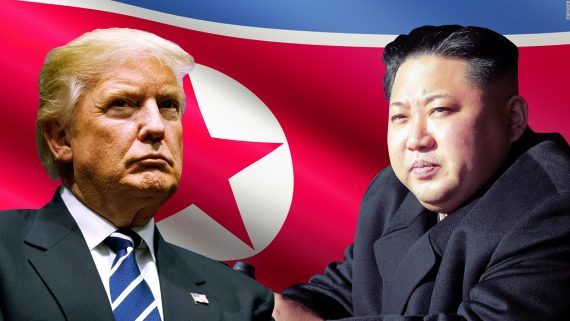

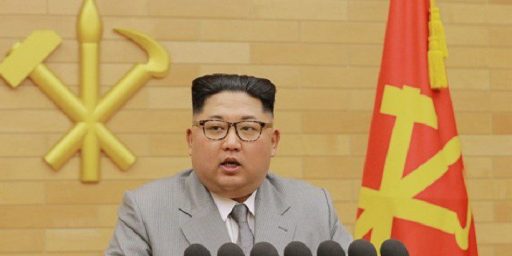

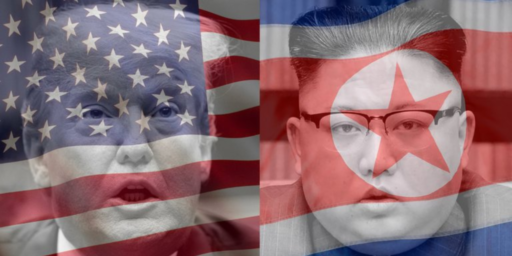
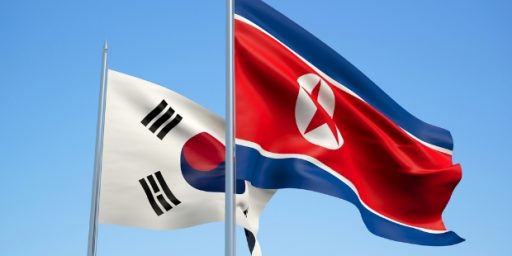
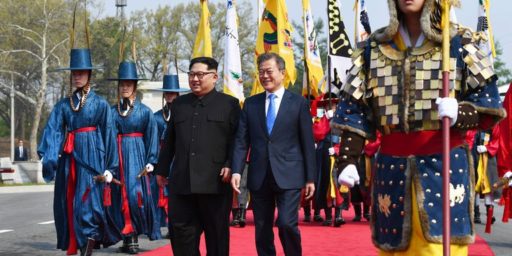
On the one hand, Trump needs a war. He badly needs a war. His administration is coming apart like a papier maché school project in a hurricane. He’s desperate to strut and posture, and he’s under the delusion that the American people will rally.
On the other hand, Trump is a coward and weakling, and blessedly so incompetent he may not be able to figure out how to start a war.
So my guess it that the next thing that happens is Kim shoots off an ICBM with a bomb-sized, re-entry capable payload. After which Trump will tweet something stupid. And yet more sanctions.
@michael reynolds:
I wonder how Trump will deal with Putin’s boast yesterday that Russia has developed an “invincible” nuclear missile.
I am not altogether sure if Trump is aware of this.
@CSK:
And showed a video of it striking FLA.
@michael reynolds: With 3 generals available who have all gone on record as having identified NK as “the greatest existential threat facing the US today,” he has staffers who can walk him through the process of starting WWIII unfortunately.
Indeed a lot of news stories i’ve seen this week have been “Trump boiling mad, desperate, angry, and crazed” and his behavior visibly shows it.
The wheels have come off the wagon.
On the other hand, I just read on this blog the other day that Hillary’s email misadventures, despite being lesser missteps than her immediate predecessor, were completely different and heinous, because of the calendar year, so at least we avoided that.
With any other person, we’d have ample notice as there’d be a buildup of public opinion for a war, like Bush did in 2003 with Iraq. Not to mention securing funding for it, if not approval, from Congress.
Trump, though, is likely to assume he can do whatever he wants, and to order the military to just start shooting. Without seeking neither approval nor funding from Congress, or selling the need for a war to the American people, or even consulting with South Korea or Japan at all, never mind China and Russia.
Bet no one predicted WWIII would be announced on Twitter.
@CSK: I don’t know Putin’s rhetoric well, but I think this was meant to impress or frighten Trump. It sounds like something the Orange Twit would say.
I mean, ballistic missiles are pretty invincible as they are. Anti-missile defenses aren’t very good at shooting them down, even when the trajectory is known in advance. Sure, you could always try an even higher in-atmosphere speed for an ICBM’s warhead, and use radar-absorbent or some other low-observable technology to make radars miss them.
We’ll know for sure if Trump announces something similar, or we see him Tweet about why the US doesn’t have “invincible missiles.”
Must be great living in Seoul knowing that you may very well end up dead or seriously wounded some time between now and November 6th, and the only reason for that is that a political party in the US is worried that it may lose an election…